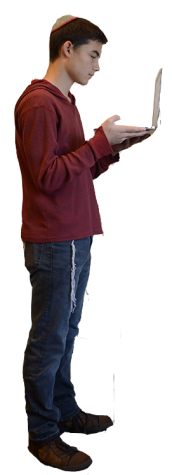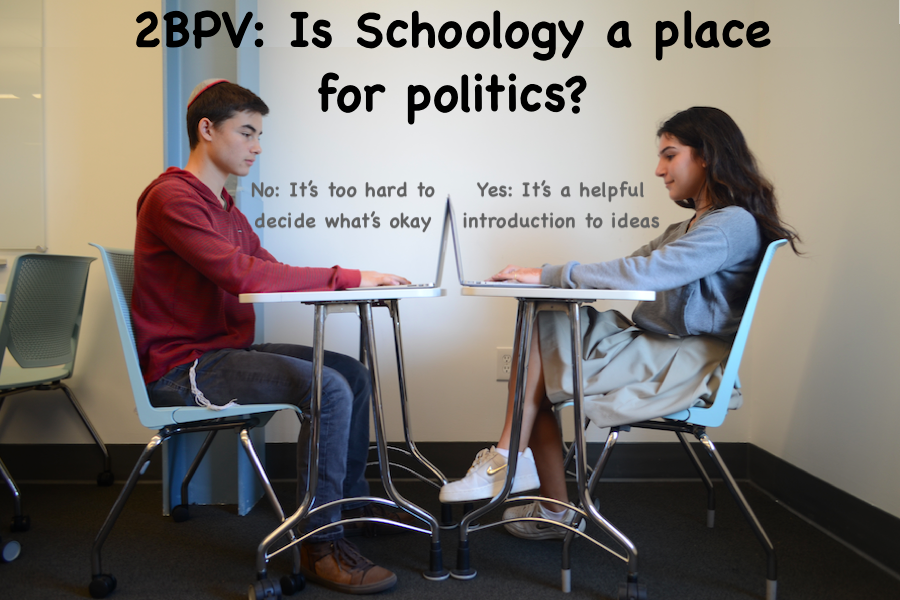No: It’s too hard to decide what’s okay
By Zach Helfand, 11th grade
 Schoology is a great resource that, for the most part, the school uses very effectively and appropriately. It’s great for everything from keeping classes organized to making announcements to the whole school.
Schoology is a great resource that, for the most part, the school uses very effectively and appropriately. It’s great for everything from keeping classes organized to making announcements to the whole school.
But Schoology should not be used as an outlet for people to share their political views.
There have been a few posts recently that have brought this issue into focus. While I don’t think there was anything the school could have done to preemptively stop this, I do believe that the school not only has the right to, but absolutely should limit or censor what is posted on Schoology.
We are in a time where the vast majority of the student body uses some form of social media. If a person wants to convey messages or share a particular stance on an issue, they should feel free to use mainstream, public social media as an outlet. But using Schoology — to reach the whole school, friends and non-friends alike — is wrong.
The reasons are simple. For one, we pride ourselves as being a place that is diverse in opinion, and as being open to hearing the other side. These posts bring out the worst in the students, whether they are unproductive comments of approval or cynical comments trying to disprove someone’s beliefs in three sentences. Too short to allow for a conversation or meaningful exchange of ideas, more likely they present clever but mindless arguments, with neither side likely to change its opinion as much as feel insulted.
Additionally, Shalhevet tries not to brand itself as associated with either political party. There is almost an assumption that if the school allows a post to remain on Schoology, it means Shalhevet itself is accepting its content.
But there could be many reasons to let something stay up or to take it down. If the administration allows a certain post that comes from one political side to stay up, are they endorsing that? If they take it down, are they making a statement? It puts the administration in a tough spot, and contradicts the principle of an impartial school.
One might argue that banning political comments from Schoology would be censoring people, or restricting them in some way. I am not denying this, rather justifying it. There have been several instances of Schoology posts being forcibly removed, and everybody at the school knows we don’t have free rein to post whatever we want. These posts have mainly been satirical content that the school finds to be inappropriate for Schoology. I am not trying to equate a political statement with a sarcastic joke made in bad taste; I am just showing that since nobody actually has the ability to post completely freely on Schoology — nor should they — the school has already stood against the idea that people should be able to say whatever they want. Complete freedom already doesn’t exist there.
For example, a few weeks ago, in the midst of the Kavanaugh hearings, there was a student Schoology post directed to the entire school urging people to message members of the Senate Judiciary Committee to vote against confirming him. That post, which contained contact information for the senators, was not taken down. But it was inappropriate because it clearly leaned to the left in the political spectrum.
Comments on the post only made it worse. First, a few people commented supportive things, such as “This is so important!!!!!” and “please email!” Then came the opposition. Numerous students who held the other side of the argument began pushing back against the post. Mindless debate broke out, none of it face to face — all on Schoology.
Then, not long after, a different student posted a satirical joke about Kavanaugh. It was met with harsh comments as well, but this time from a member of the faculty. The school has no need for this, nor should we allow it to continue.
This is not to say that people should stop sharing their ideas. There’s a whole world of social media not associated with our school where that can happen. Just about every student is capable of sharing opinions or urging their peers to take a certain course of action without the use of Schoology, a school-sponsored outlet.
I also do see a distinction between posting to a private group on Schoology and posting to the whole school; depending on the nature of the group, it could potentially make sense. For example, while it would surely make no sense for me to post my reasons for or against a politician to the Schoology group of a sports team, a group such as the Young Americans For Freedom (the only political-type club I can think of in the school) would receive that very differently.
Schoology is the wrong place for advertising your beliefs. No matter what your political view is, there will be at least one person in opposition to it within the school. There’s no need for us to allow Schoology to become a place where people feel personally offended.
If we were more careful and didn’t treat Schoology so loosely, it would be a much better resource for us and we wouldn’t have to worry about these inappropriate posts. With Schoology limited to announce- ments and assignments — or political chat in political groups – we can engage in healthy conversation about other matters elsewhere, either in person or online.
Yes: It’s a helpful introduction to ideas
By Rena Harkham, 10th grade
 I went on Schoology looking for my Talmud homework, but instead I found myself falling down a rabbit hole of politics, and reasons why Brett Kavanaugh shouldn’t have been appointed to the Supreme Court.
I went on Schoology looking for my Talmud homework, but instead I found myself falling down a rabbit hole of politics, and reasons why Brett Kavanaugh shouldn’t have been appointed to the Supreme Court.
Politics are a contentious topic among the Shalhevet students and teachers, and the latest expression of these tensions is in various political posts on Schoology. Schoology is a great way for students to organize their homework assignments and spread important announcements. It should also be a place where students feel free to share their opinions.
One thing I love about Shalhevet is how it opens up my mind by introducing new ideas and presenting new perspectives, while giving me space to formulate my own opinions. People want to spread their opinions where others will see them, and at Shalhevet, Schoology is that place.
In fact, Schoology is actually the best way for political topics to be talked about, because it can be used as an extension of our Town Hall discussions. Students who run out of time, haven’t really formed an opinion yet during Town Hall itself, or don’t feel comfortable speaking yet can use Schoology as a place to continue the conversation online to convey their opinions and restart the discussion.
And high school is a great place to start creating deeper opinions on things like religion, politics and current affairs. Being exposed to these different opinions helps us formulate our own, and prevents us from falling mindlessly into the crowd later on in our lives.
Some may say that politics should not be discussed on Schoology because arguments could get heated, or that Schoology should just be a place for assignments and announcements. I’d argue that it’s quite the opposite. As a Just Community, we are all part of one Shalhevet kehilla, and we know that at the end of the day our intention is merely to share. Schoology is already a place where students discuss topics such as their love of Israel, chesed (service) opportunities and clubs, whether fashion, astrology or cooking. If we ban politics, what’s next — should we stop discussing food?
Get the latest from The Boiling Point. Sign up for our news feed.
Others may argue that Schoology is a more personal version of social media apps like Instagram and Facebook, and that those are the proper platforms for political debate. Though Schoology is filled with people we interact with on a daily basis, there are still some people who I don’t interact with daily, making Schoology the perfect place to hear or gain more insight on opinions that I otherwise might not hear.
Moreover, on social media we tend to look at (or be shown) only the side of things we want to see. Schoology gives us the opportunity to hear the other side of the story.
Before I came to Shalhevet, I was completely oblivious to the world of politics. Town Hall and Schoology helped open my mind to form new opinions and ideas, introducing me to new things like joining Model Congress and staying more in touch with current events. I am grateful for this.
Since Shalhevet is a place where we can all share our world- views, Schoology should be too. Otherwise our own opinions can close off views of the world that are important for us to see — views held by people right here at our own school.
Looking for my Talmud homework that night when I came across the Kavanaugh controversy, and as I thought about what to make of this, I remembered one of the iconic quotes of Beit Hillel: “If I am not for myself, who will be for me?…If not now, when?” If I am not learning about these topics now, when will I? If I don’t know who I am now, when will I?
That is why it is necessary for us to talk about these important topics now, because if we don’t learn how to do this now — how to think and how to respectfully argue — then when will we? Schoology needs to be a free and open place to exchange ideas, just as Shalhevet is.
CLICK HERE TO READ OTHER TWO BOILING POINTS OF VIEW
